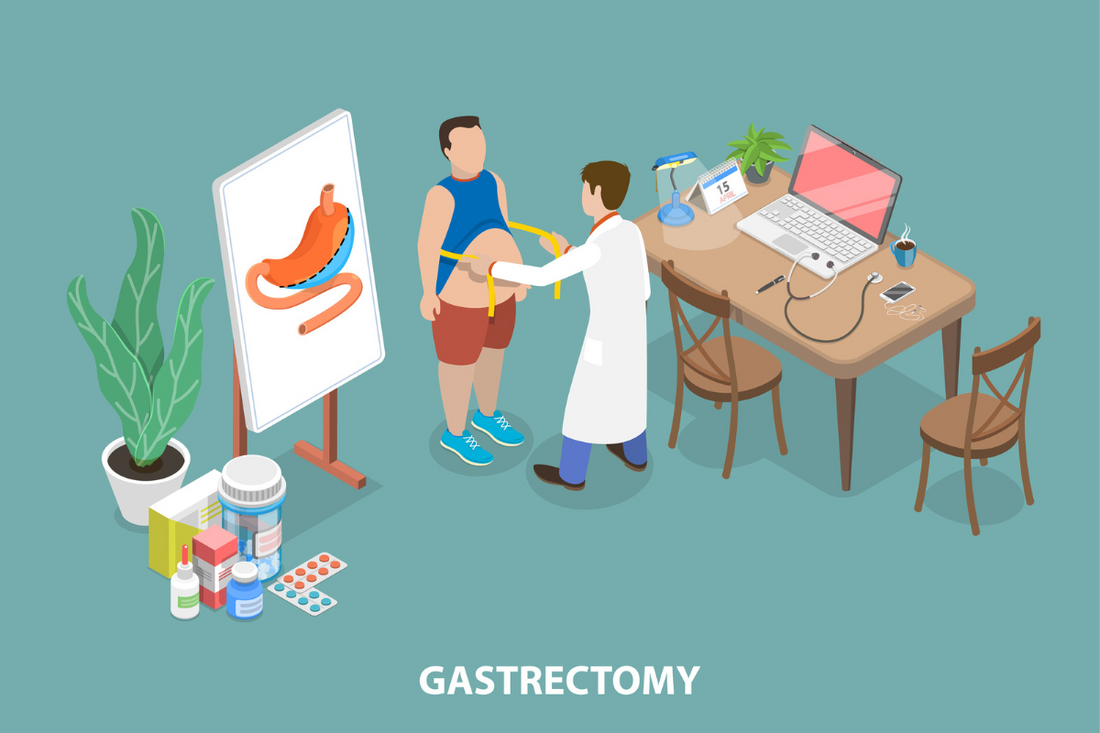Table of Contents
Gastric sleeve surgery can be a life-changing procedure for those struggling with obesity. this is done by reducing the stomach size helping you feel full faster, promoting weight loss, and ultimately leading to a healthier lifestyle. However, it is important to remember that the surgery is only one part of your journey to weight loss success.
To maximize the benefits of your gastric sleeve and ensure your weight loss goals are reached, there are several post-operative lifestyle changes you should consider making. These changes, such as adopting a nutritious diet plan, engaging in regular physical activity, and addressing any emotional hurdles, can contribute to sustained and long-lasting weight loss outcomes.
Integrating these components into your daily routine can also support overall physical and mental health. As you continue to embark on your weight loss journey, remember that consistency and dedication are key factors in achieving the results you desire after gastric sleeve surgery.
Understanding Gastric Sleeve Surgery

Gastric sleeve surgery, more formally referred to as sleeve gastrectomy, is a type of bariatric surgery that can help you lose weight by reducing your stomach size. This surgery is often considered an option when other weight loss methods, such as diet and exercise, have not resulted in significant weight loss.
A significant amount of your stomach is removed during the gastric sleeve operation, leaving you with a smaller, sleeve-like pouch. This new stomach has a reduced capacity, which means you will feel full more quickly and consume less food. Additionally, the surgery also impacts the production of hunger hormones, resulting in a decrease in appetite.
One important aspect to consider is that gastric sleeve surgery is a major procedure and comes with potential risks and complications. Some of these risks include infection, blood clots, leaking from the stomach, and nutritional deficiencies. It's crucial to discuss the surgery with a qualified healthcare professional to determine if it's the right option for you and to understand all the possible side effects.
Once you've undergone gastric sleeve surgery, your lifestyle will need to change to ensure the success of the surgery. You will need to adjust your eating habits to accommodate your new stomach size. This typically involves eating smaller meals more frequently and focusing on foods that are high in protein and low in fat and sugar. Additionally, it's necessary to take daily supplements to ensure that your body receives the required nutrients.
By following the appropriate dietary guidelines and making changes to your lifestyle, gastric sleeve surgery can potentially lead to significant weight loss, improved health, and a higher quality of life. However, it's essential to remain committed to this new way of life, as weight loss is not guaranteed and weight can be regained if healthy habits are not maintained. Remember that the surgery is a tool to help kickstart your weight loss journey, and your own efforts and dedication play a crucial role in achieving and maintaining the desired results.
Post-Surgery Diet Essentials
Liquid Diet Stage
After your gastric sleeve surgery, it's crucial to follow a liquid diet for the first few weeks. This will allow your stomach to heal properly. During this stage, you should focus on consuming clear liquids such as water, broth, and sugar-free gelatin. Gradually, you can include thicker liquids like thin soups, skim milk, and unsweetened fruit juices. Make sure to drink slowly and take small sips to prevent any discomfort.
High Protein Foods
Once you've transitioned from the liquid diet stage, it's important to prioritize high-protein foods in your gastric sleeve diet. Protein helps with tissue repair, maintains muscle mass, and keeps you feeling full for longer periods. Some excellent protein sources to consider are eggs, cottage cheese, yogurt, lean meats, and fish.
|
High-Protein Foods |
Protein Content |
|
Eggs |
6g per egg |
|
Cottage Cheese |
14g per 1/2 cup |
|
Greek Yogurt |
15g per cup |
Remember to consume small portions, chew your food thoroughly, and drink liquids separately from your meals to avoid overfilling your smaller stomach.
Avoid Empty Calories
As you continue with your post-surgery diet, avoid empty calories, such as sugary or fried foods. These provide little to no nutritional value, can cause rapid weight gain, and may lead to dumping syndrome, a condition where food moves too quickly through your digestive system.
Instead, focus on consuming nutrient-dense foods that support your weight loss goals and overall health. A balanced diet should include lean protein, whole grains, fruits, and vegetables. Pay attention to your body's signals, stop eating when you feel full, and stay hydrated throughout the day.
By adhering to these guidelines and working closely with your healthcare team, you'll be on the right track to maximize your weight loss and achieve lasting results after your gastric sleeve surgery.
The Role of Physical Activity

Incorporating physical activity into your daily routine plays a crucial role in maximizing weight loss after gastric sleeve surgery. Regular exercise helps increase your calorie deficit, improve your metabolic rate, and maintain muscle mass.
Develop an exercise routine: Start by incorporating low-impact exercises, such as walking or swimming, into your daily routine. Gradually increase the intensity and duration of your workouts as your stamina improves. Aim for a minimum of 150 minutes of moderate aerobic exercise per week or 75 minutes of vigorous aerobic exercise.
Strength training: Adding strength training exercises to your workout plan is essential for maintaining and increasing muscle mass. This helps you burn calories more efficiently and achieve better weight loss results. Engage in strength training exercises two to three times per week, focusing on all major muscle groups.
Preserve muscle mass: As you lose weight, it is crucial to maintain your muscle mass through resistance training and consuming adequate protein. Doing so helps prevent unwanted muscle loss and supports your metabolic function.
Remember, it is always essential to consult your healthcare professional before beginning any exercise routine to ensure it is safe and appropriate for your specific circumstances. With the right approach to physical activity, you can enhance your weight loss journey and enjoy lasting success after gastric sleeve surgery.
Long-Term Lifestyle Changes

Implementing long-term lifestyle changes is crucial in order to maximize weight loss after your gastric sleeve surgery. These changes can help you maintain a healthy body weight and avoid potential complications. The following paragraphs outline some important habits to incorporate into your daily life.
Maintain a balanced diet: Focus on consuming nutrient-rich foods, such as lean proteins, whole grains, fruits, and vegetables. Be mindful of portion sizes, as overeating can lead to discomfort and increased weight gain. Avoid calorie-dense foods high in sugar or fat and aim to stay hydrated throughout the day.
Exercise regularly: Engage in physical activities that you enjoy, like walking, swimming, or cycling. Aim to get at least 150 minutes of moderate-intensity aerobic exercise per week, as well as strength training exercises for major muscle groups at least twice a week. Make sure to consult your healthcare team for personalized recommendations on exercise routines post-surgery.
Monitor your emotional health: Emotional well-being is a crucial aspect of long-term weight management. Consider seeking support from a mental health professional to explore any emotional obstacles to your weight loss journey, such as emotional eating, stress, or body image concerns. Join support groups, or share your experiences with peers who have undergone similar surgeries, to help you navigate through this process.
Establish a consistent sleep routine: Prioritize getting enough sleep, as sleep deprivation can negatively impact your weight loss efforts. Aim for 7-9 hours of quality sleep every night. Create a relaxing bedtime routine and maintain a consistent sleep schedule to promote better sleep habits.
By making these long-term lifestyle changes, you'll increase your chances of successfully maintaining a healthy body weight. Remember to consult with your healthcare team to tailor these changes to your unique circumstances, and be patient as your body adjusts to your new habits. Embrace the process, and take pride in your commitment to a healthier you.
Understanding Your New Stomach
After undergoing gastric sleeve surgery, it's crucial to understand the changes that have occurred within your body. Your stomach is now a significantly smaller gastric pouch, which means it can hold less food, ultimately leading to weight loss.
The shrinking of your stomach capacity plays a vital role in changing your eating habits. It is essential to listen to your body and recognize the new cues it is sending regarding hunger and fullness. Since your gastric pouch can only hold a limited amount of food, you must make mindful choices about what you consume and focus on nutrient-dense options.
As you adapt to your new stomach, it is necessary to develop healthy eating habits. These may include:
- Eating smaller, more frequent meals: Instead of consuming three large meals per day, aim for five to six smaller meals. This will help prevent overloading your gastric pouch and enable better nutrient absorption.
- Chewing food thoroughly: To ensure proper digestion and avoid discomfort or complications, take the time to chew each bite thoroughly before swallowing.
- Drinking fluids separately from meals: It is advisable to separate your fluid intake from your meals by at least 30 minutes. This will help prevent your gastric pouch from filling up too quickly and will also aid in the absorption of nutrients.
- Avoiding high-calorie, low-nutrient foods: Due to the limited capacity of your gastric pouch, it is essential to focus on healthy, nutrient-rich foods such as lean proteins, fruits, and vegetables. Avoiding sugary and fatty options will maximize weight loss results.
As you progress on your weight loss journey, remember that lifestyle changes play a significant role in maintaining long-term results. Implementing regular physical activity and maintaining a support network of friends, family, and healthcare professionals will help ensure your success. Your new stomach is a powerful tool, but it is your commitment to a healthier lifestyle that will ultimately help you reach your weight loss goals.
Regular Health Check-Up
After your gastric sleeve surgery, it is essential to maintain regular health check-ups with your bariatric surgeon. These appointments will allow your surgeon to monitor your body's weight loss progress and ensure there are no complications post-surgery.
During these visits, your healthcare team will evaluate your overall health and, if necessary, adjust your diet and supplement intake. Nutritional deficiencies are a possible risk after gastric sleeve surgery, so it is vital to identify and address any gaps in your nutrition. Your bariatric surgeon will keep an eye on essential vitamins, minerals, and indicators of overall health.
Maintaining an adequate intake of calcium and other minerals is crucial to avoid deficiencies that could negatively impact your health. Your healthcare team may recommend supplements or dietary changes to help you meet your nutritional needs. Taking the supplements as advised and following the suggested meal plans will help you achieve a well-balanced diet that supports your weight loss journey.
Remember to discuss any concerns or symptoms you may experience with your bariatric surgeon. They will provide guidance and support to help you achieve and maintain a healthy lifestyle after your gastric sleeve surgery. By attending regular health check-ups and following your healthcare team's advice, you can stay on track and maximize your weight loss potential.
Risk And Complications

After undergoing a gastric sleeve surgery, it is important to be aware of the possible risks and complications. This knowledge can help you manage potential issues and maximize your weight loss journey.
One common issue you might face after gastric sleeve surgery is nausea and vomiting. This can be a result of eating too much, too quickly or consuming foods your stomach cannot tolerate. To minimize this risk, it is essential that you follow the prescribed post-operative diet and consume small, nutrient-dense meals.
Another potential complication is weight regain. Although gastric sleeve surgery contributes significantly to initial weight loss, maintaining those results is largely dependent on your adherence to a healthy lifestyle. Engaging in regular physical activity and making mindful dietary choices are crucial for long-term success.
Nutrient deficiencies can also arise from gastric sleeve surgery. Due to the reduced stomach size, your ability to absorb certain vitamins and minerals might be compromised. To counteract these deficiencies, it is vital that you take vitamin and mineral supplements as prescribed by your healthcare team. Frequent check-ups and blood tests will help identify any nutrient shortfalls that may need further attention.
Finally, it is important to remember that every surgical procedure carries inherent risks. Gastric sleeve surgery may lead to complications such as infection, bleeding, or leakage at the surgical site. Be proactive in addressing these concerns by maintaining open communication with your healthcare providers and promptly reporting any unusual symptoms you experience.
Benefits of Gastric Sleeve Surgery
Gastric sleeve surgery can be a highly effective solution if you are struggling with obesity and looking to lose excess weight. By reducing the size of your stomach, this procedure helps you feel full sooner, ultimately leading to a decrease in caloric intake. Here are some of the key benefits you may experience following gastric sleeve surgery:
Improved Weight Loss: Gastric sleeve surgery is renowned for its ability to help patients achieve substantial weight loss. Many individuals who undergo this procedure can expect to lose approximately 60% to 70% of their excess body weight within the first two years post-surgery. This can significantly lower your body mass index (BMI) and lead to improved overall health.
Reduced Health Risks: Obesity often results in numerous health complications, such as sleep apnea, high blood pressure, and increased cardiovascular risks. Losing excess weight through gastric sleeve surgery can greatly reduce, or even completely resolve, many of these health problems. Ultimately, this transformation can lead to a longer and healthier life.
Increased Mobility: Carrying excessive weight can place immense strain on your joints, greatly impacting your mobility. As you lose weight after gastric sleeve surgery, you're likely to experience increased ease of movement, making everyday activities more manageable and enjoyable.
Positive Psychological Impact: Obesity can take a toll on your emotional well-being, often leading to feelings of depression, isolation, and low self-esteem. Gastric sleeve surgery offers a significant weight loss solution, allowing you to transform not only your physical health but also boost your mental well-being. As you shed those extra pounds, you'll likely see an improvement in your overall mood and self-confidence.
By considering gastric sleeve surgery, you're taking an important step towards improving your health and reclaiming control over your life. This procedure has the potential to deliver significant weight loss and improve numerous obesity-related health conditions.
Also Read: Expected Weight Loss After Bariatric Surgery (with Timeline)



 Order Free Sample
Order Free Sample





